the place where Paleontology and Paleoanthropology meets Philately
Palau
Fossils, dinosaurs and other prehistoric animals and humans, Charles Darwin on stamps of Palau
| << previous country | back to index | next country >> |
Contents:
- Country overview
- Philately of Palau
- Official stamps of Palau related to Paleontology
- Other stamps of Palau to consider
- Postal stationeries of Palau related to Paleontology
- References
- Acknowledgements
Palau, officially the Republic of Palau, is an island country with a population of 17,948 on 465 km2, located in the western Pacific Ocean.
It contains approximately 250 islands, which form the western chain of the Caroline Islands in Micronesia.
The most populous of these is Koror. The capital Ngerulmud is located on the nearby island of Babeldaob, in Melekeok State.
Palau shares maritime boundaries with Indonesia, the Philippines, and the Federated States of Micronesia.
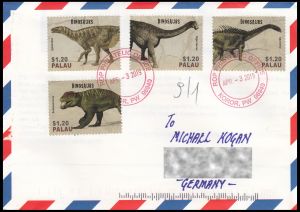
|
| Regular letter from Palau, with dinosaur stamps from 2014, sent to Germany in 2019. |
The islands first used stamps of Germany for the Caroline Islands and then stamps of Japan from 1914 to 1944.
The islands then became part of the U.S. Trust Territory of the Pacific and used American stamps until 1983.
In 1944, Pelew (Palau) became a trusteeship territory under the United Nations, administered by the USA.
The first of the Palauan’s own stamps were issued in 1983 after they gained sovereignty from the United States.
In the first 10 years, the country issued 40-70 stamps a year. The situation changed in 1994 when Palau became a customer of IGPC agency, who started to produce a lot of stamps a year. Over 180 stamps were produced in 1994. The record was in 2000, when 300 stamps were produced on behalf of Palau. [R2]
Official stamps of Palau related to Paleontology: fossils, dinosaurs and other prehistoric animals and humans, Charles Darwin
| 23.12.1988 "Palau's Chambered Nautilus" [1] | 22.04.1995 "Earth Day" | 02.02.2000 "Millennium" [2] |
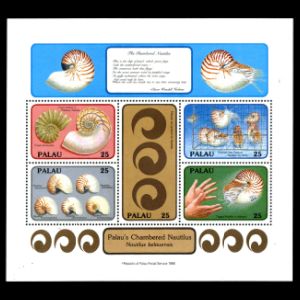 |
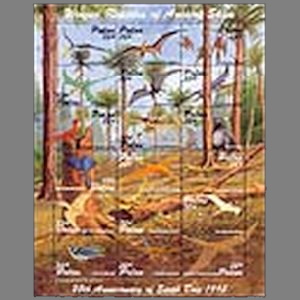 |
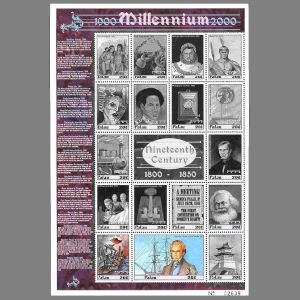 |
| 15.03.2000 "20th century discoveries" | 20.06.2000 "Dinosaurs" | 13.10.2004 "Dinosaurs" |
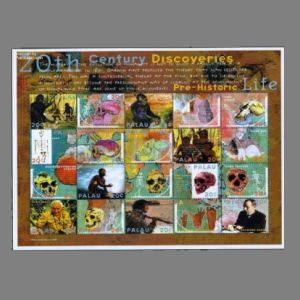 |
 |
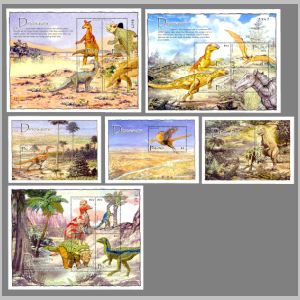 |
| 02.03.2010 "Charles Darwin" | 22.12.2014 "Dinosaurs" | |
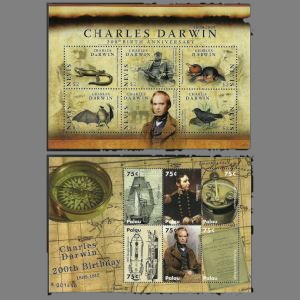 |
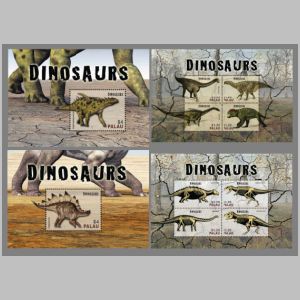 |
 |
Notes:
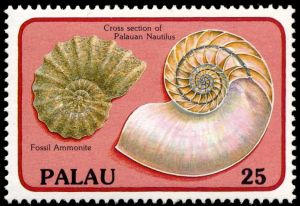
|
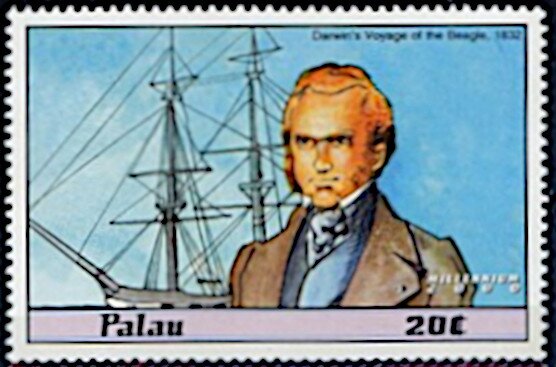
|
| Ammonite on stampof Palau 1988 MiNr.: 260, Scott: 203a | Charles Darwin on stampof Palau 2000 MiNr.: 1602, Scott: 539 |
The Nautilus is the last remaining genus of the subclass Nautiloidea, a group of shelled cephalopods closely related to the ammonoids (an extinct group of shelled cephalopods) and the coleoids (octopi, squids, and cuttlefish).
Six living species of Nautilus are recognized including the Palauan Nautilus, Nautilus belauensis. [R3]
[2] Charles Darwin shown on a stamp on the bottom side of the mini sheet.
Charles Darwin (1809 -1882)
was an English naturalist, geologist and biologist, best known for his contributions to the theory of evolution.
His proposition that all species of life have descended from common ancestors,
published in his most famous book "On the Origin of Species" in 1859.
This theory is now widely accepted and considered a fundamental concept in all biological science, including paleontology.
Other stamps of Palau to consider: mix of prehistoric, mythological and modern animals
| 26.11.1993 "Prehistoric and Legendary Monsters of the Pacific" | ||
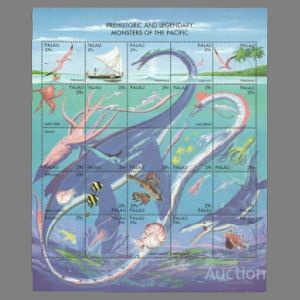 |
|
|
Postal stationeries of Palau related to Paleontology: fossils
| 23.12.1988 "Palau's Chambered Nautilus" [1] | ||
 |
|
|
References:
- [R1] Palau:
Wikipedia,
WikiTravel,
Flag Counter
- [R2] Postal History and Philately of Palau:
Wikipedia,
Links to official website of the Post Authority, stamp catalog and a list of new stamps of Palau are here. - [R3] Nautilus belauensis: Wikipedia,
Acknowledgements:
Many thanks to Dr. Peter Voice from Department of Geological and Environmental Sciences, Western Michigan University, for reviewing the draft page and his valuable comments.
| << previous country | back to index | next country >> |